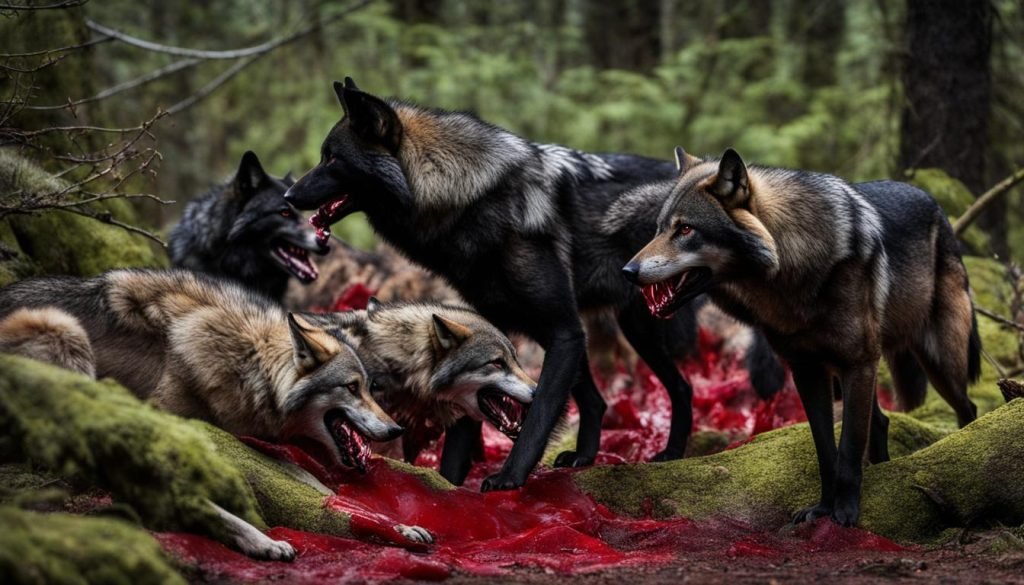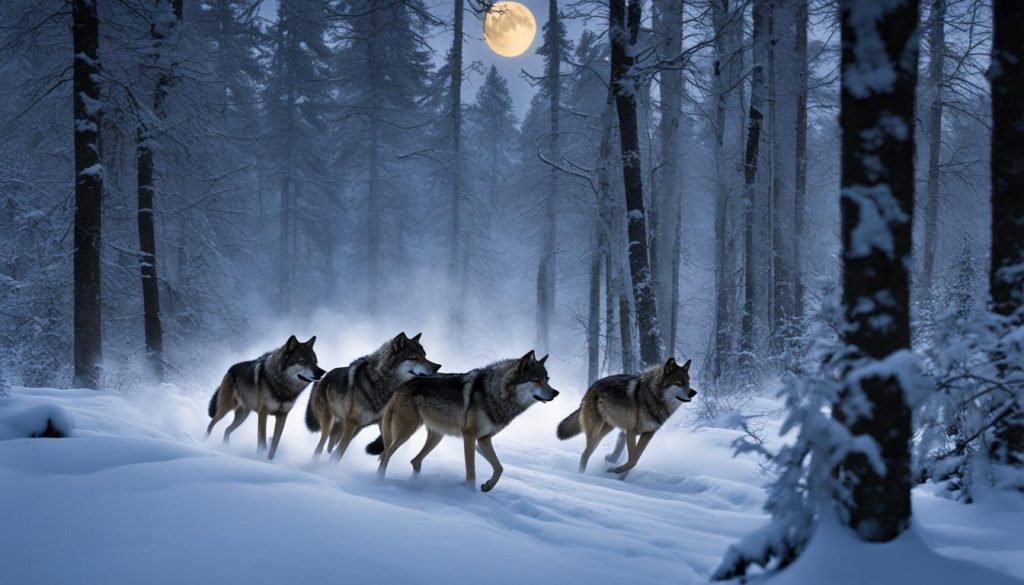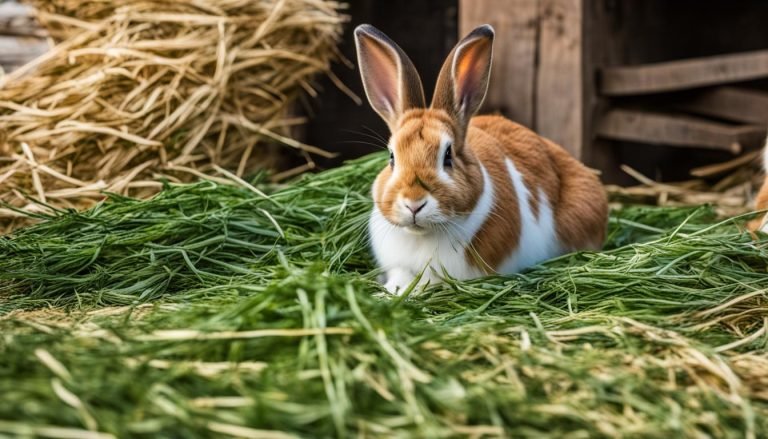Discovering Nature: What do Wolves Eat?
Wolves are fascinating creatures, boasting a fierce reputation for their predatory instincts and pack mentality. But have you ever wondered what do Wolves eat?
Join me as we explore the wolf’s diet and uncover their eating habits. We’ll reveal what is included in the wolf’s diet and some of their dietary preferences.
Wolf Quiz
How well do you know wolves? Test your knowledge below!


Key Takeaways:
- Wolves are carnivorous animals, but they may also consume herbivorous or omnivorous meals.
- Their food preferences are influenced by factors such as availability, nutritional value, and prey behavior.
- Wolves hunt in packs, using complex strategies to capture prey.
- Understanding the nutritional requirements of wolves and the balance they maintain in their diet is crucial to appreciating their complex nature.
- By exploring their dietary habits, we can gain a deeper understanding of these magnificent creatures and their role in the ecosystem.
Exploring the Carnivorous Diet of Wolves
As a carnivorous species, wolves rely primarily on animal meat to fulfill their nutritional needs.
When it comes to wolf-feeding behavior, they are apex predators, meaning that they sit atop the food chain and hunt a variety of prey. While domesticated dogs have evolved to eat grains and vegetables, wolves still maintain their natural predatory instincts.
The natural prey of wolves varies depending on their location and habitat. In North America, wolves typically hunt elk, moose, deer, and bison. Wolves in Europe and Asia may hunt smaller mammals such as rabbits and rodents but can also go after larger prey like reindeer and wild boar.
A wolf’s diet is not limited to fresh kills, however. They are known to scavenge and consume carrion, such as dead animals left behind by other predators.
It’s important to note that a wolf’s diet can be influenced by external factors, such as the availability of prey and the season. In times of scarcity, wolves may be forced to hunt smaller or less desirable prey, and in the winter, they may rely more heavily on carrion to survive.

Overall, the carnivorous diet of wolves is a fascinating and essential aspect of their nature. By understanding their natural prey, feeding behavior, and scavenging habits, we can gain a greater appreciation for these majestic creatures.
Unveiling the Hunting Patterns of Wolves
As carnivorous animals, wolves hunt their prey to satisfy their dietary requirements. Understanding the hunting patterns of wolves is crucial to understanding their diet and eating habits. Wolves are known to be strategic hunters, and their hunting methods vary depending on the prey they are chasing.
Their hunting patterns usually involve teamwork, with each member of the pack fulfilling a specific role in the hunt. The pack members work together to corner their prey, with some wolves chasing the prey while others wait in ambush. They use their keen senses of smell, hearing, and sight to track their prey and predict their movements.
Wolves are highly adaptable creatures, and their hunting strategies change depending on the season and the availability of prey. For example, in the winter, they may resort to hunting large animals, such as elk and moose, since smaller prey may be scarce.
A wolf’s diet is primarily made up of meat, and they prefer to hunt herbivorous animals such as deer, elk, and moose. However, they will also hunt smaller mammals such as rabbits and rodents if their preferred prey is not available. They are opportunistic hunters, and will even scavenge for food if necessary.
Despite their predatory nature, wolves are not always successful in their hunts. Studies have shown that wolves only catch their prey around 20% of the time. This low success rate is due to a range of factors, including the skill of the prey, the terrain, and the weather conditions.

“Wolves are known to be strategic hunters, and their hunting methods vary depending on the prey they are chasing.”
In conclusion, understanding the hunting patterns of wolves is crucial to understanding their diet and eating habits. They are strategic and adaptable hunters that work together to catch their preferred prey. While their diet is primarily made up of meat, they will also consume smaller mammals and even scavenge for food if necessary. Despite their skill, wolves are not always successful in their hunts.
Herbivorous or Omnivorous Meals for Wolves?
Wolves are often portrayed as exclusively carnivorous animals. However, this is a common misconception as wolves are known to consume herbivorous and omnivorous meals as well. In fact, wolves have been observed to eat a variety of plant-based foods such as berries, roots, and grasses.
While these meals do not make up the majority of their diet, they do play an important role in providing additional nutrients. For instance, during seasons when prey is scarce, wolves have been known to rely on plant-based foods to survive. Additionally, consuming plant-based foods can also aid in digestion and help wolves maintain a healthy gut.
However, it is important to note that wolves primarily rely on meat as their main source of food and obtaining nutrients. A study conducted by the Wisconsin Department of Natural Resources found that 91% of the wolf’s diet consists of deer, elk, and other ungulates. This highlights the carnivorous nature of wolves and their strong preference for meat-based meals.
Therefore, it is accurate to say that wolves are both herbivorous and carnivorous animals, with their diet primarily consisting of meat.
Example of the Wolf’s Omnivorous Diet
An example of the wolf’s omnivorous diet is the consumption of blueberries. Blueberries are an important source of nutrition for wolves during the summer months when they are abundant. A study conducted by the Voyageurs Wolf Project found that wolves consumed blueberries both as whole berries and in partially digested form from the scat of bears. The study also noted that the consumption of blueberries may help wolves gain weight and prepare for the upcoming winter season.
While the consumption of plant-based foods is not common in the wolf’s diet, it does showcase their adaptability and ability to survive in different environments and situations.
Dive into the Wolf’s Food Preferences
As carnivorous animals, wolves have a range of food preferences that reflect their predatory instincts. Their diet consists mainly of large mammals such as deer, elk, and caribou, but they also consume smaller prey like beavers and rabbits. The food preferences of wolves are influenced by their natural habitat and location, as well as the availability of prey.
Factors that Influence Food Choices
Wolves are opportunistic animals and will consume whatever prey is available in their territory. Factors that impact their food choices include:
- The relative abundance of prey in their environment.
- The size and strength of potential prey.
- The season and availability of prey.
- The age and health status of the wolf.
Wolves are also known to scavenge when food is scarce. They have been observed consuming carrion or the remains of dead animals, as well as garbage and human food when living near human populations. However, scavenging is not their preferred method of obtaining food and is only done when necessary.
Variety of Prey Consumed
Wolves have a diverse diet and are capable of consuming a variety of prey. In addition to the large mammals they hunt, they also consume smaller animals like rodents and birds. Wolves have been known to hunt in packs, taking down larger prey and working together to feed the entire pack.
Interestingly, wolves have also been documented consuming plant material. While the bulk of their diet is meat-based, they have been observed consuming berries and other fruit during certain times of the year. This suggests that wolves may have some omnivorous tendencies, but the role of plant material in their overall diet is still a topic of debate among researchers.
Adapting to Changing Environments
The food preferences of wolves are not set in stone and can change depending on their environment. In areas where natural prey is scarce, wolves may turn to livestock or other domestic animals for food. Conversely, in areas where wolves are hunted or persecuted by humans, they may become more nocturnal and hunt smaller, easier-to-catch prey.
Understanding the food preferences of wolves is crucial to understanding their overall diet. By studying their eating habits, researchers can gain insights into their behavior and the impact of environmental changes on the wolf population.
The Intricate Balance of the Wolf’s Diet
With the knowledge gained from exploring the wolf’s diet and eating habits, it is clear that they maintain an intricate balance in their nutritional intake. A wolf’s diet must provide all the necessary nutrients for survival, including protein, vitamins, and minerals. Their diet must also adapt to the changing seasons and availability of prey.
Nutritional Requirements of Wolves
Wolves require a diet rich in protein to support their muscular bodies and active lifestyle. Their diet should also provide them with the appropriate levels of vitamins and minerals to maintain optimal health. Wolves are known to consume the bones, fur, and organs of their prey, which provide additional nutrients that they need to survive.
Eating Habits of Wolves
Wolves are opportunistic hunters, meaning they will consume any prey that they can capture. They have a varied diet that includes large mammals like deer, elk, and moose, as well as smaller animals like rodents and birds. They may also consume plant matter, such as berries and grasses, to supplement their diet.
Adaptation to Seasonal Changes
Wolves must adapt their diet to the changing seasons to ensure their survival. During the winter, when prey is scarce, they may consume more plant matter or smaller prey to compensate for the lack of large game. In the spring and summer, they may have access to more prey and consume larger animals to maintain their nutritional requirements.
The Delicate Equilibrium
By understanding the nutritional requirements and eating habits of wolves, we can appreciate the delicate equilibrium that they maintain in their diet. Wolves must balance their need for protein with the availability of prey, while also ensuring they consume a varied diet to meet their nutritional needs. It is this delicate balance that allows them to thrive in their natural environment and remain a vital part of our ecosystem.
More About Wolves:
- How Do Wolves Mate? Explained
- Wolves Lifespan: How Long Do Wolves Live?
- 15 Facts About Wolves People Don’t Know
- Wolf Quiz: How Well Do You Know Wolves?
Frequently Asked Questions
What do wolves eat?
Wolves primarily eat meat, with their diet consisting mainly of large ungulates such as elk, deer, and moose. However, they are opportunistic hunters and also consume smaller mammals like rabbits and rodents.
What is included in the wolf’s diet?
The wolf’s diet mainly consists of meat but can include other components such as organs, bones, and even vegetation in certain cases. They have been known to eat berries and grasses, especially during seasons when prey is scarce.
What are the wolves’ feeding behavior and hunting patterns?
Wolves are social hunters that live in packs. They often hunt in a coordinated manner, utilizing their teamwork and strategic planning to bring down large prey. They are also known for their endurance, as they can travel long distances to find food.
Are wolves herbivorous or omnivorous?
Wolves are primarily carnivorous animals, but they can also consume plant-based food sources. While their diet is mostly meat-based, they have been observed eating vegetation and fruits on occasion. However, these plant-based components are not a significant part of their overall diet.
What influences the food preferences of wolves?
The food preferences of wolves are influenced by various factors including availability, seasonality, and natural prey abundance. Their preferences can also be shaped by the specific characteristics of their habitat and their pack’s hunting success.
How do wolves maintain a balanced diet?
Wolves have evolved to maintain a delicate balance in their diet. They consume a range of prey species, which allows them to obtain the necessary nutrients for their survival. They also have adaptations that enable them to efficiently digest and utilize the nutrients from their food.







